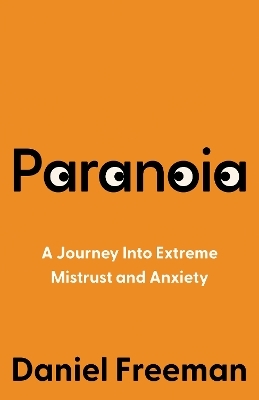
Paranoia
William Collins (Verlag)
978-0-00-847259-7 (ISBN)
'FASCINATING… SHOCKING' SPECTATOR
What is paranoia? What makes us mistrustful? How can this be overcome?
Daniel Freeman, Professor of Psychology at Oxford, has spent thirty years at the vanguard of paranoia research and treatment. This remarkable and moving book tells the story of that journey.
For decades, conventional wisdom held that paranoia was only experienced by people with severe mental health problems and little could be done to rectify its disastrous effects. Paranoia gives us a front row seat as Freeman turns the traditional view on its head.
He develops life-changing treatments for clinical paranoia – often using state-of-the-art technology like virtual reality. He reveals that suspicion is rife in society, with paranoia widespread, conspiracy theories rampant and emotion all too often trumping evidence. He discovers the causes of mistrust, including the role of genes, trauma, lack of sleep, worry, low self-confidence, cannabis use and hearing voices, and delves into the murky world of Covid-19 conspiracy theories. Lighting up the narrative throughout are the rarely heard voices of people whose lives have been almost wrecked by paranoia – and then in many cases transformed by Freeman’s groundbreaking treatments.
This is also a practical book. Freeman shows how we can measure our own levels of mistrust. He explains how we can remedy things if those levels are higher than we’d like, because although mistrust can seem engrained, things can change for the better. Ultimately, it can be overcome. Compelling and compassionate, this is a gripping tale from the front line of suspicion – an impassioned plea for the urgent rebuilding of trust between us all.
Daniel Freeman is a Professor of Clinical Psychology and NIHR Senior Investigator in the Department of Psychiatry at the University of Oxford and a consultant clinical psychologist in Oxford Health NHS Foundation Trust. Professor Daniel Freeman is the world’s leading researcher of paranoia. He holds the Chair of Psychology at the University of Oxford and is a Professorial Fellow of Magdalen College, Oxford. Daniel is a consultant clinical psychologist in Oxford Health NHS Foundation Trust, a National Institute for Health and Care Research (NIHR) Senior Investigator, and leads the Oxford Cognitive Approaches to Psychosis (O-CAP) research group. A Fellow of the British Academy, he presented the BBC Radio 4 series A History of Delusions.
| Erscheinungsdatum | 30.01.2024 |
|---|---|
| Verlagsort | London |
| Sprache | englisch |
| Maße | 153 x 234 mm |
| Gewicht | 400 g |
| Themenwelt | Literatur ► Biografien / Erfahrungsberichte |
| Sachbuch/Ratgeber ► Gesundheit / Leben / Psychologie ► Psychologie | |
| Geisteswissenschaften ► Psychologie ► Persönlichkeitsstörungen | |
| Medizin / Pharmazie | |
| Sozialwissenschaften ► Soziologie | |
| ISBN-10 | 0-00-847259-9 / 0008472599 |
| ISBN-13 | 978-0-00-847259-7 / 9780008472597 |
| Zustand | Neuware |
| Informationen gemäß Produktsicherheitsverordnung (GPSR) | |
| Haben Sie eine Frage zum Produkt? |
aus dem Bereich


